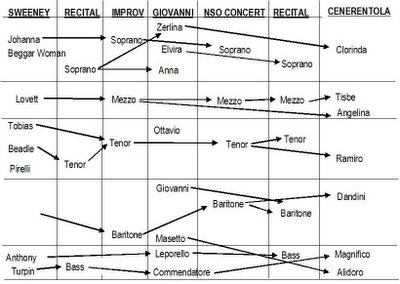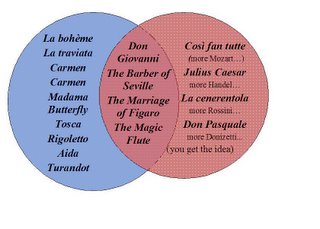Things Are Not Always What They Seem
Barbara Cook’s Master Class – A Response
As they say, I should’ve been there. And since I wasn’t, I shouldn’t have assumed.
Two days ago, I interpreted a New York Times account of Barbara Cook’s master class at Juilliard through my own particular lens of experience and expectation. Why? I believe so firmly in what I took to be the ultimate goal of this class that I made the error of assuming that the method was sound.
I’ve since heard from some of the participants and observers of that class, and now is the time to retract, reframe, and review.
Agendas
I’m wary and mistrustful of the hidden agendas of public master class exercises. Somehow, I thought – or perhaps hoped – that this class was an exception. Its goals, as least as seen through the lens of the reporter, seemed unassailable. But since learning more about what happened that day, I realized that my naiveté got the best of me.
Eye-witness accounts inform me that there was a generous helping of “tough love” (bordering on abusive) tactics. Responses like “You sing with the kind of diction that really puts me off” and “No one really talks like that; what do you think you’re trying to do?” and “What is that smile doing there? That is totally phony”.
I’m not strictly against using mildly confrontational language in the right time and place. It’s important to be unafraid to tackle the elephant in the room. When working with singers with whom you have a relationship of trust, and in an environment where artists feel secure enough to venture out of their comfort zone, it’s possible for a “tough love” approach to have lasting benefits. But in a public place, when the balance of power is as skewed as it is in a master class…. Things are learned, but too often, they’re not about performing or communicating.
Playing the Game
What happens when the obedient student feels threatened by the respected Master’s comments? Many of them have done enough master classes to know that you have to play the game according to its particular rules. Roll with the punches. Be dutiful. The star will emerge triumphant, a short-term goal will be attained, and the audience will respond positively.
Some comments from Juilliard artists who were involved with this master class:
The greatest injury was done to the singers, who were not given liberty to express themselves, but devolved into ironically artificial sentimentality in a necessary concession to win over Cook and her adoring fans, and in so doing, betrayed their own truth. They played the game to get through the master class, and they were rewarded for being less than themselves.
The game we played was "opera singer who is only concerned about making sound is taught about communication"… And, predictably, the comments from patrons at the reception afterwards [were] ‘You should sing like that all the time’...I learned that if I take all the resonance out of my voice and sing to the woman in the fourth row, I’m a genius.
Reactions
Why such reactionary and bitter comments? I will say, for those of you who haven’t been on the inside of these kinds of things, that these reactions are fairly typical. Naysayers will maintain that these are shallow self-protective responses from nervous young people.
I know some of these people, and I disagree. Yes, they are half Ms. Cook’s age with a fraction of her experience. But they are thoughtful, self-critical, imaginative, and committed to communicating through their music. And consider this: If singers feel they have to retreat to such a defensive posture, what could they possibly learn?
Technique
I’ve said that dealing with technique (vocal production, placement, projection, etc) is dangerous and destructive content for a master class. And I still mean it. But it seems that in this particular situation, it would’ve been a good idea to constructively address the challenge of aligning operatic vocal technique (read: the ability to fill a big hall) with the directness and economy of communication needed for musical theatre songs.
Again, from the participants:
Equating authenticity with the ‘abandonment of technical propriety’ only reinforces the mistaken perception that musical theater is from Mars and opera is from Venus, when the message ostensibly is that honesty of communication is requisite in all art forms… Telling ‘classically trained singers’ that their education leads to artificiality is likely to be neither successful nor meaningful for them.
[Ms. Cook’s] method of extracting ‘communication’ from me was having me pare down my instrument to a mere filament (perfect for a miked performance, really), getting rid of my stultified diction and having me sing to the woman in the 4th row. Yes, there was some communication that went on. The medium was all wrong.
Where Do We Go From Here?
Do I still believe in some of things I wrote Sunday? You bet I do.
I quoted Ms. Cook: “The place that seems most dangerous is exactly where safety lies.” But the caveat is that none of us knows where that place is for another artist. If we lead them blindly in any direction, just for the sake of variety or experimentation, we’re likely to lead them even farther astray. That ‘place’ is unique to each singer, and the answer doesn’t lie in stripping away his technique, but in using it to create a relationship with the music, with the words, with the audience.
Am I even more jaded now about the firmly entrenched diva approach to these classes? Didn’t think it was possible, but… yes.
Is it still more important than ever to throw away artifice and caution and dare to revel in the risks and rewards of live performance? Of course.
Singing Bloggers
Scroll down to the bottom of Sunday’s entry for a message from a “Singing Blogger”. S/he asks some important questions, not all of which I pretend to have the answers to. But I’ll give it a whirl in a day or two.






 Any questions?
Any questions?


